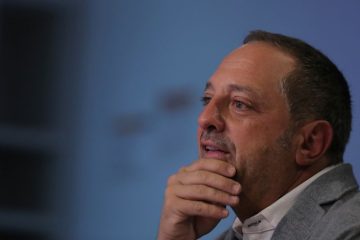Why Martin Shkreli Is Guilty When Investors Didn’t Lose

Martin Shkreli became notorious for raising the price of a potentially life-saving HIV drug by 5,000 percent overnight and getting banned from Twitter for harassing a female journalist. His criminal fraud trial in Brooklyn, New York, had nothing to do with any of that, however. It was about whether laws were broken when the fund manager got in a hole and lied about it. He managed to make up the losses before getting caught, but that didn’t keep him from being convicted of fraud Aug. 4.
1. What were the charges?
He was accused of lying to investors about two, now-defunct, hedge funds that he managed, MSMB Capital and MSMB Healthcare. Prosecutors said he ran a Ponzi-like scheme, using investors’ money to start a drug company, Retrophin Inc., and later looting $ 11 million of Retrophin assets to pay them off.
2. What was he convicted of?
The jury found him guilty of two counts of securities fraud and one count of conspiracy to commit securities fraud, related to the operations of MSMB Healthcare fund. He was acquitted of fraud charges related to Retrophin, where prosecutors alleged the biggest losses occurred.
3. What were the lies that got him convicted?
Documents presented in court show that Shkreli lied about everything from the value of the funds he managed — he claimed it was $ 100 million, when at one point, the net asset value of a fund fell to minus 33 cents — to the performance of the funds, claiming they were outperforming the S&P 500 Index. He accepted investments until the last minute, before shutting the funds down. And he promised investors a full refund or shares in his startup pharmaceutical company.
4. How much did investors lose?
Nothing. Shkreli partly repaid them with Retrophin stock and several witnesses told the jury they ended up with multimillion-dollar profits. One invested $ 1.25 million in Shkreli’s hedge fund, got $ 1.6 million back and 150,000 Retrophin shares, currently worth about $ 2.9 million. Another said she ended up with a $ 2.7 million profit from a $ 300,000 initial investment. But they struggled, sometimes for years, to get the money back.
5. So if no one lost money, what’s the problem?
Think of it this way: In “Ferris Bueller’s Day Off,” Matthew Broderick’s character leaves his Ferrari with two parking valets. They take the car for a joyride and return it undamaged. No one was hurt. But they broke the law — the valets stole the car.
6. How did prosecutors convince the jury there was a crime?
By showing he lied to investors. It’s illegal to make material misstatements of fact to investors. According to the controlling laws enacted to protect investors, a “material fact” is anything that would be important in the decision-making process of a reasonable investor.
7. What was Shkreli’s defense?
His lawyers used a “no harm, no foul” argument focused on the fact that investors made money. During cross examination of investors, the defense argued that investors didn’t question Shkreli’s peculiar behavior because he was a biotech genius.
8. What’s he facing now?
He is almost certain to go to prison. Shkreli, 34, faces as long as 20 years behind bars, although he’s likely to serve much less. The judge let Shkreli return home, where he’s spent hours each day on social media. She said she’d see him soon, though she didn’t set a date for sentencing.
Martin Shkreli became notorious for raising the price of a potentially life-saving HIV drug by 5,000 percent overnight and getting banned from Twitter for harassing a female journalist. His criminal fraud trial in Brooklyn, New York, had nothing to do with any of that, however. It was about whether laws were broken when the fund manager got in a hole and lied about it. He managed to make up the losses before getting caught, but that didn’t keep him from being convicted of fraud Aug. 4.



